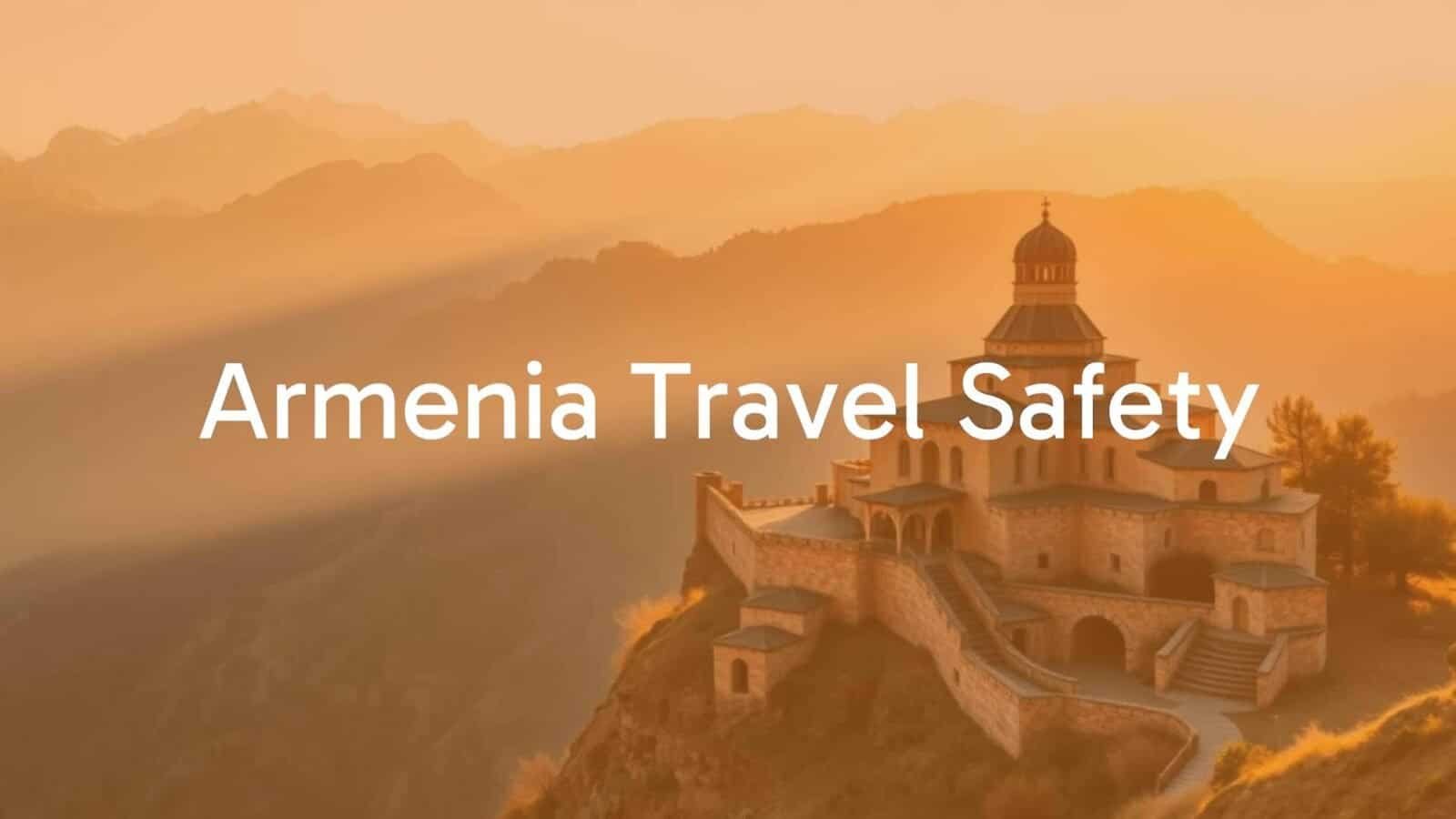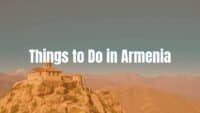Wondering if Armenia is safe to visit? The simple answer is yes-Armenia is widely seen as a safe country for tourists, with low crime rates and a strong sense of public order. Still, like any travel destination, there are details and local issues you should know about. Armenia is well-known for its ancient history, beautiful scenery, and friendly people. However, its location and relationships with some neighboring countries, especially near the borders with Azerbaijan, mean you should stay aware of your surroundings. This article breaks down what you need to know about staying safe during your trip to Armenia, offering clear advice to help you have a worry-free visit.

Travel safety overview in Armenia
Current travel advice and overall risk
As of April 9, 2024, Armenia has a Level 2 travel advisory from the U.S. Department of State-“Exercise Increased Caution.” The main reason for this warning is a risk of conflict in certain border regions with Azerbaijan. Most tourist spots, especially Yerevan (the capital), are far from these areas and are considered safe.
Canadian and Australian authorities suggest regular precautions across most of Armenia, but they also urge travelers to be careful near the eastern border with Azerbaijan. So, while you should know about and avoid higher-risk areas, you can confidently visit popular sights in other parts of the country.
Common myths about safety in Armenia
Some people wrongly believe all of Armenia is dangerous because of its neighbors or news coverage. Really, only border zones are affected by tensions. Most of Armenia is peaceful, including cities and heritage sites.
Another myth is that crime is widespread. In reality, serious crime is rare. Small thefts, like pickpocketing, can happen (as in any tourist area), but are not common. Locals are known for being welcoming, and issues like harassment or police corruption are uncommon. Remain aware, but don’t let fears spoil your plans.
Is Armenia safe for solo and female travelers?
Armenia is especially safe for solo travelers, including women. Numbeo rates Armenia as high for safety, especially for walking alone, even at night, in places like Yerevan. Street harassment is much less common than in many Western cities.
Armenian culture typically respects women. While using common sense regarding public affection (especially for LGBTQ+ travelers) is wise, most visitors describe a secure and relaxed environment. For those exploring rural spots, joining groups or hiring a local guide is a good idea and can make solo trips even smoother.

Main risks and regional issues
Border regions and conflict areas
The most significant risk comes from Armenia’s borders near Azerbaijan. There have been conflicts in the past; though things have been more settled since September 2023, the security situation remains tense. Governments like the U.S., Canada, and Australia say not to travel within 5 km of the eastern border due to fighting and landmines. This ban is only for border areas, not the whole country.

Roads in these regions may cross borders or be closed. Even places that look peaceful can be risky because of mines or leftover ammunition. Always follow warnings and avoid these areas altogether.
Nagorno-Karabakh area
Nagorno-Karabakh has long been argued over by Armenia and Azerbaijan. While a ceasefire mostly holds, problems still sometimes occur. The U.S. recommends against visiting this region; support if you need help is limited, and the security situation can change quickly. As of September 2025, it remains a high-risk zone and should only be entered with caution and up-to-date information.
Eastern border with Azerbaijan
This border is clearly listed as a “Do Not Travel” zone. The main concerns are possible military actions, landmines, and sudden clashes. U.S. Embassy rules also bar non-essential travel for their staff to areas like Gegharkunik east of Vardenis and Syunik east of Goris and south of Kapan. Avoid traveling here, especially after dark, and stay alert to local news if you are remotely nearby.
Border with Nakhchivan
The area near the border with the Azerbaijani enclave of Nakhchivan is also risky. Even if not always completely closed, it’s best to stay at least 1 km away since military incidents sometimes happen. The Canadian government’s ability to help travelers here is very limited. Always listen to local authorities if you’re close to these areas.
Civil unrest and protests
Protests happen often in Armenia, mostly in Yerevan. They are usually peaceful, but sometimes things get out of hand and can disrupt traffic or services. Avoid protest areas, watch local news for updates, and do what local police instruct. Even usually quiet crowds can become chaotic, so simply stay away to avoid unexpected trouble.
Terrorism threat in Armenia
Terrorist attacks in Armenia are very rare, but there is always a possibility, like in any country. Main public places-airports, bus stops, shopping centers, and busy squares-are more likely to be targets if anything did happen. In 2022 there were bomb threats (turned out to be false alarms) in Yerevan’s airport and metro.
Stay alert, especially in crowds or during holidays. If you see an emergency situation (like a bomb alert), expect police presence and cooperate with instructions. Staying aware is your best safeguard.
Crime and tourist scams
Violent and petty crime levels
Serious crime rarely happens in Armenia. Most cases involving tourists involve minor theft, like purse snatching or pickpocketing, mainly in busy public places (markets, buses, etc.).
- Keep your things close, especially when it’s crowded.
- Don’t carry a lot of cash or valuables.
- Lock your accommodations when you leave.
Police may take longer to arrive than in some Western countries, and may not speak English well, but usually do respond. If you drive, be careful-car break-ins, while not common, are the most reported crime among visitors.
Tourist scams to watch for
- Taxis: Overcharging, especially at the airport, is a common scam. Confirm the price before getting in, or use official apps like Yandex Taxi or GG.
- Fake guides and money changers: Only use official services to avoid fraud.
- “Friendly strangers”: Sometimes people will try to distract you near ATMs, “help” you, then ask for payment or try to steal from you. Be polite but firm with anyone who seems overly helpful or insistent.
- Online scams: Don’t send money to people you only know online. Romance and financial scams have happened.

Safety at night and in cities
In Yerevan, walking at night is usually safe, and it’s common to see people out late. Still, if you are alone, stick to main streets and well-lit areas. In smaller towns, lighting may be limited, so take extra care, especially after 11 PM. When unsure, use trusted taxi services to travel after dark.
Health and medical safety
Recommended vaccines
Talk to your doctor before you go to Armenia. You don’t need special vaccines to enter, but make sure your standard shots (like MMR, polio, and flu) are up to date. Flu shots are advised at least two weeks before going if your trip is while flu is common (November-April).
- Hepatitis A: Good idea for all travelers. Spread through contaminated food or water.
- Hepatitis B: Especially for people who might have contact with blood or bodily fluids.
- Rabies: Rare, but possible if you’re in close contact with animals-ask your doctor if it makes sense for your trip.
Common health risks and tips
- Travelers’ diarrhea: Most common problem. Drink boiled or bottled water, and eat food that is thoroughly cooked and served hot.
- Brucellosis: Linked to unpasteurized dairy. Avoid these products.
- Typhoid and TB: Present in Armenia, especially if visiting hospitals or shelters. Practice good handwashing.
Insect and tick bite protection
- Use insect repellent outdoors.
- Wear light-colored, long-sleeved shirts and pants.
- Check for ticks after spending time outdoors.
- Use mosquito nets when sleeping outside.
Animal bites and food safety
- Stay away from stray animals, particularly dogs and bats. Supervise children closely.
- If bitten, wash the wound with soap and water, and get medical help right away.
- Only eat pasteurized dairy and properly cooked meat.
Medical care and emergencies
Medical help in Yerevan is decent, with hospitals like Astghik, Erebouni, and Shengavit Medical Centers. Outside of Yerevan, the quality of care drops, fewer staff speak English, and emergency response can be slow. Sometimes, cash is needed before getting treatment. For serious problems, you might need to leave the country for better care. Ambulance service can be patchy outside the capital-sometimes taking a taxi or private car to the hospital is quickest.
Key emergency numbers:
| General emergency | 108 or 911 |
| Police | 102 |
| Medical/ambulance | 103 |
| Fire | 101 |
Travel insurance
Good travel insurance that covers medical care, hospital stays, and emergency evacuation is strongly recommended. Without it, you could end up paying a lot for even basic treatment. Check that your insurance is accepted by clinics in Armenia, and clarify language support before you need help. Insurance is also important for covering theft and lost property.
Natural and environmental hazards
Earthquakes
Armenia is earthquake-prone-one major earthquake caused heavy damage in 1988. Learn what to do in an earthquake: drop, cover, and hold on. Check if your hotel is built to modern codes.
Flood and weather issues
Rain is heaviest from March to June and October to November. Floods sometimes hit valleys like Ararat and Shirak, making roads unusable. Landslides can also block routes in mountain areas. In May 2025, big floods badly hurt Tavush and Lori provinces. Always check local weather reports when traveling, and avoid affected zones. If storms or floods hit, wait for the all-clear from officials, and listen for evacuation alerts.

Transport safety and road conditions
Driving and road standards
Main roads, especially in Yerevan, are fairly good, but rural roads are often in poor shape-think limited lighting, potholes, and missing signs. In winter, snow removal is not always reliable.

- Many drivers go fast, ignore traffic rules, and can be aggressive. Drive carefully.
- Pedestrians and bikes may not be noticed by motorists.
- Don’t drive at night on rural roads if you can avoid it.
- If stopped for a traffic check, police may sometimes ask for bribes-say no firmly and politely.
- You’ll need an International Driving Permit or Armenian license, and car insurance is required.
Public transport: taxis, trains, buses
- Yerevan has buses, trolleybuses, and a metro-cheap and mostly dependable.
- Taxis: Use apps like GG and Yandex Taxi for set prices and safer rides. Always check the driver’s info and have small bills for payment.
- Trains: Mostly go north, but can be crowded and basic-lock your bags and don’t leave items unattended.
- Marshrutkas (minibuses): Popular but not recommended for tourists-drivers are risky, vehicles crowded, and theft has been reported. For longer trips, pick buses suggested by your hotel or use shared taxis instead.
Flying inside Armenia
There’s little domestic air travel. Most flights are international, using Yerevan’s Zvartnots Airport. The U.S. FAA hasn’t officially checked Armenia’s aviation standards. If flying regionally, look up the airline’s safety history. Conflicts in nearby areas may impact flight availability, so check for changes before traveling.
Local rules, customs, and culture
Essential laws for travelers
- Photography: Don’t take pictures or videos near border zones, military sites, or at government buildings. Using drones is also restricted in these areas.
- Drugs: Laws are very tough, including for marijuana. Having drugs-even for medical reasons-is illegal. Bring prescriptions for any medicines you need and check they are allowed by Armenian law.
- Military service: Male dual citizens aged 18-28 can be required to serve or may be stopped at the border. Check with your country’s Armenian embassy if concerned.
Photography tips
No photos near military, engineering, or government buildings-if unsure, don’t take pictures or ask permission. Serious trouble can result from not following this, including fines or detention. Normal tourist photos are fine away from these places.
Money and currency
- The Armenian Dram (AMD) is the local currency.
- Credit cards work in cities and larger shops, but many places-especially in rural towns-only take cash.
- Use ATMs at banks, not street kiosks. Watch for card scams or skimming devices.
- If changing money, always use a bank.
- Declare any currency over 10,000 USD (or equivalent) when arriving/departing. This also covers traveler’s checks and some securities-ask at customs if unsure.
LGBTQ+ and minority travelers
- LGBTQ+ relationships: Not illegal, but public attitudes can be conservative. Discrimination does happen, and reporting abuse to police may not always lead to help. Caution with public displays of affection is suggested, especially outside major cities.
- Travelers with disabilities: Access isn’t as easy as in many Western countries, and services can be limited.
- Foreign visitors: Armenia sometimes shares information about guests with Russian security services, which may affect some travelers, especially if you’ve previously worked in or visited Russia as a U.S. government or military person.
Emergency contacts and support
Important numbers
| General emergency (police, fire, ambulance, rescue) | 108 or 911 |
| Police | 102 |
| Ambulance | 103 |
| Fire | 101 |
| Gas emergency | 104 |
English-speaking operators are available at 911. If you need non-urgent medical care, hospitals in Yerevan can help. The U.S. Embassy offers a list of English-speaking doctors in the city.
Embassy and consular help
| U.S. Embassy | 1 American Avenue, Yerevan 0082 Phone: +374-10-464-700 After hours: +374-10-494-444 |
| Canada Honorary Consul | 129 Armenakyan Str., 0047 Yerevan Phone: +37410 300305 |
| Australia (no embassy in Armenia) | Call the Australian Embassy in Moscow or the 24-hour Consular Emergency Centre |
Enroll in your government’s traveler registration service (such as the U.S. STEP or Canada’s Registration of Canadians Abroad) to get updates and be easier to contact in emergencies.
Practical travel safety tips for Armenia
How to stay safe
- Carry a copy of your passport and keep the original in a safe place.
- Don’t flash money or expensive items.
- Use ATMs inside bank buildings.
- Refuse offers from strangers, especially around ATMs or when invited out by people you don’t know.
- In rural or hard-to-reach areas, go with a trusted guide or tour group when possible.
- For adventure activities (like hiking): pick approved operators, stick to marked trails, and have insurance with medical evacuation coverage if possible.
- Always keep aware of your surroundings, just like you would anywhere unfamiliar.
What to pack for safety
- ID and documents: Copy of your passport, visa, insurance, and emergency contacts, stored separately from the originals.
- Basic medicine: Bandages, painkillers, any personal prescription drugs (with a copy of the prescription).
- Portable charger: To keep your phone powered for navigation and emergencies.
- Weather-ready clothes: Armenia has changing weather, so bring layers, comfortable shoes, and a rain jacket or windbreaker.
- GPS or paper maps: Especially for rural areas with poor signal.
- Travel locks: For luggage when using shared hotels or hostels.
- Water bottle: For carrying bottled or boiled water.
- Bug spray: Especially if you plan to be outdoors a lot.
How to stay informed
- Check your government’s travel advice page (e.g., U.S. State Department, Canadian government, Australian Smartraveller).
- Sign up for travel safety emails or mobile alerts provided by your government.
- Follow official accounts on social media (e.g., your country’s embassy or foreign ministry).
- Watch Armenian news and listen for updates about protests, weather, or transportation changes.
Staying up to date will help you adjust your plans quickly and travel with more peace of mind.
















Leave a comment